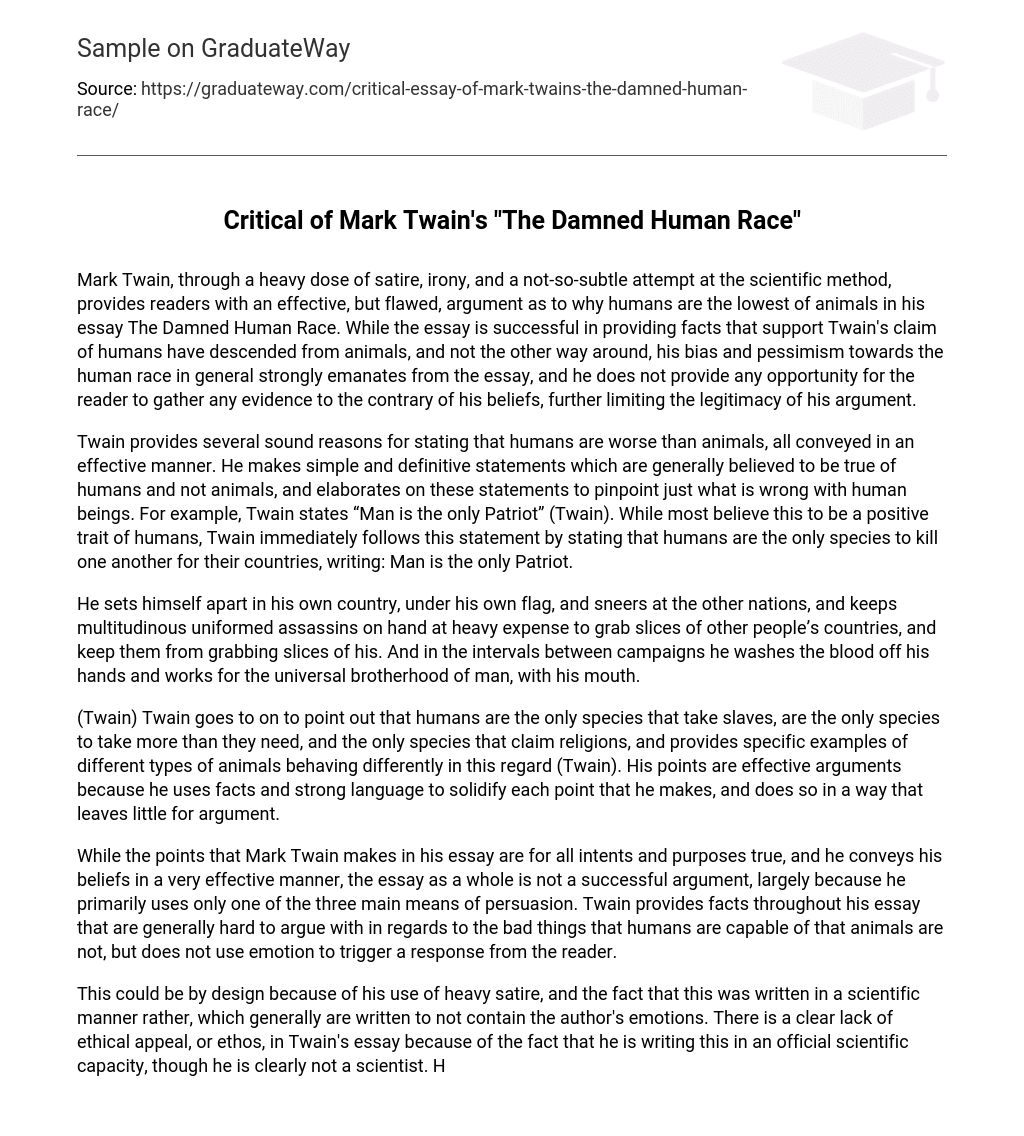In his essay “The Damned Human Race,” Mark Twain uses satire, irony, and a scientific approach to argue that humans are the lowest of animals. While successful in presenting evidence that humans descend from animals rather than the other way around, Twain’s bias and pessimism towards the human race is evident throughout the essay. He does not allow readers to consider any opposing evidence, thus diminishing the credibility of his argument.
Twain presents multiple compelling arguments for his assertion that humans are inferior to animals, and he effectively communicates these points. He articulates straightforward and conclusive statements that are commonly associated with humans rather than animals, and he further expounds upon these statements to identify the specific flaws of human beings. One instance of this is when Twain proclaims, “Man is the only Patriot” (Twain). While many people view this as a commendable trait of humans, Twain quickly follows up by highlighting that humans are also the only species willing to kill each other in the name of their countries, emphasizing: “Man is the only Patriot.”
In his own country, under his own flag, he distinguishes himself from others. He belittles other nations and maintains a large number of trained killers at great cost to seize territories of others and prevent them from seizing his. During breaks between these conquests, he cleans the blood off his hands and professes support for the global unity of all people, but only in words.
According to Twain, humans are unique in several ways. They are the only species to enslave others, to take more than what they need, and to establish religions. Twain supports his arguments by giving examples of how animals behave differently in these aspects. By using factual evidence and strong language, Twain effectively strengthens each point, leaving little room for counterargument.
Although Mark Twain effectively conveys his beliefs in his essay, the overall argument is unsuccessful as he primarily relies on one means of persuasion. Twain presents indisputable facts about the capabilities of humans compared to animals, but fails to evoke an emotional response from the reader.
The absence of ethical appeal or ethos can be attributed to the deliberate use of heavy satire by Twain and the scientific approach adopted in his writing. Scientific texts are typically devoid of the author’s emotions. Moreover, Twain’s essay lacks opposing views and contradictory information, as he writes in an official scientific capacity despite not being a scientist, thereby restraining readers from obtaining a comprehensive perspective on the story.
Mark Twain could have presented evidence and logical reasoning to highlight the unique qualities and abilities that humans possess, such as their involvement in charitable activities, social welfare initiatives, and providing medical care. However, it is important to note that The Damned Human Race, an essay by Twain, is primarily a work of satire. This is evident from the outset as Twain asserts, “I have not guessed or speculated or conjectured, but have used what is commonly called the scientific method” (Twain).
Twain, a renowned author known for his humor and famous works, published this essay in 1905. Despite lacking scientific expertise, Twain openly expressed his dislike for humanity, possibly influenced by personal circumstances and life experiences. It is debated whether Twain’s life was any more troubled than that of the average person (Byrne 19). Consequently, these factors prevent the essay from being viewed as a credible argument and indicate that it is more of a rant from the author, albeit an impactful one.
Despite providing numerous factual details about the human race that are true and warrant the attention of the reader, Mark Twain’s essay is heavily infused with bias and satire, thereby overshadowing any potential credibility it may hold. Moreover, the cynicism evident throughout the piece cannot be disregarded, as even in the final line, Twain describes the decline of the human race from animals, asserting, “Below us, nothing” (Twain).
Works Cited
Byrne, William F. “Realism, Romanticism, and Politics in Mark Twain.” Humanitas 12. (1999): 16. ProQuest. Web. 25 Jan. 2014.
Twain, M.. N.p.. Web. 15 Jan 2014.





